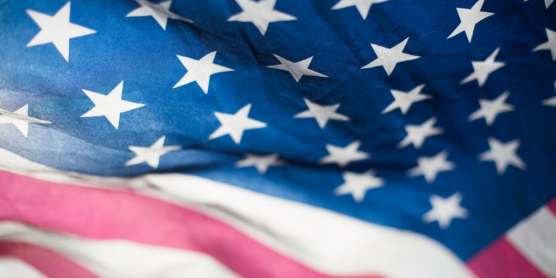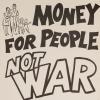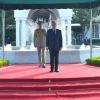Dear Flag Kneelers,
“Oh, say, does that Star-Spangled Banner yet wave, o’er the land of the free and the home of the brave?” As I finished signing these renowned words with heartfelt affection, there was a moment of awed silence that came over the audience. It wasn’t because of the way I sang, but the words of the anthem seemed to silently echo in the air. In this moment I was once again reminded of the unique way our national anthem brings Americans together and the beauty of the country the song represents. Only a year after I sang "The Star-Spangled Banner" at my varsity volleyball game, the words of our national anthem that should unite us began to bring community tension. During the customary playing of the U.S. national anthem before National Football League (NFL) games, many football players have decided to kneel, not stand, before the flag. This has sparked much positive and negative attention: many people are happy to see protests and many people have booed players for kneeling (Hoffman and Belson). Even Vice President Mike Pence walked out when football players protested the national anthem (Watkins). "The Star-Spangled Banner" has come to “represent not only the flag but the nation itself” (Blackstone, Clague, Kuster). The anthem and the flag remind us of the country they stand for. It’s not about a piece of fabric or even the music itself; it’s about whom we are as a nation. Many arguments against protesting the national anthem are focused on the act as being disrespectful to the military and country. While in some ways I would agree with that notion, it’s much greater than that. My opposition to kneeling during the national anthem is due to the unity of our country that the national anthem and the flag bring to us as its citizens.
"The Star-Spangled Banner" became the official U.S. national anthem in 1931. The poem from which the lyrics are derived was written in 1814 by Francis Scott Key after viewing the Battle of Baltimore from a British ship during the War of 1812 (Lineberry). The words of his lyric depict his emotional triumph of seeing the flag still flying, signifying the American victory. It is said that "The Star-Spangled Banner" was played before a sporting event in 1862 and in the 1918 World Series (Clague). During the 1918 World Series, World War I was raging on and its affects were felt throughout the U.S. A brass band played “The Star-Spangled Banner” at one of the games and the mood of the crowd completely changed and people began to sing along. They were so moved by the performance that the New York Times wrote about the anthem singing at the game (Jacobson). The tradition of playing the song before each game fully started during World War II. Canada began playing their anthem before every hockey game, and after the attack on Pearl Harbor, the U.S. followed suit and our national anthem was performed at every hockey game and every other type of sporting event in the United States. Once the war was over, the tradition continued (Clague).
The history of our anthem is not new for most of us. Considering the importance we are taught of honoring our nation by standing for the anthem and facing the flag, why are people protesting it? NFL quarterback Colin Kapernick started this demonstration in the 2016 preseason by sitting during our national anthem to protest and bring attention to the recent racial injustices and inequalities and systematic oppression that he feels. After speaking with a U.S. veteran, he decided to kneel to be more respectful to the military. He stated to the NFL media in a CNN article, “I am not going to stand up to show pride in a flag for a country that oppresses black people and people of color” (Willingham). He and the many players that have joined him since that preseason have stated their frustrations about our country. America has a past of slavery and racial oppression and we don’t have to look hard to find fairly recent stories of racial injustice. Recently at my university campus, racial slurs were written with permanent marker on the door of every African-American in a hallway in one of the dorms. This type of behavior is unacceptable and frustrating; I understand and am saddened at such occurrences, and want to do my part in ending them. Many players have stated that they do not want to be disrespectful to our country or military, but they do not want to “show pride” in it, either. They feel betrayed and are using their right to free speech to say something about it (Willingham). Due to the millions of people watching football and the fact that players are mostly seen during games, protesting at this time has gained a wide audience, which I have heard many of my fellow students say is why this is a great way to protest.
The reasons that many football players are kneeling is why I believe we must stand for our national anthem, our flag, and our country. Not only because it is the flag code, not only because not standing can seem disrespectful, but because we are to be united. Even through the injustices that you may feel, our national anthem will bring solidarity and comfort you are looking for. Think back to the history of our anthem mentioned above. The lyrics were written during war, performing our anthem became a standard practice during war, and singing it together became a tradition during war. Wars, especially large scale wars, bring times of distress not only to soldiers and their families, but to every individual of the warring country. "The Star-Spangled Banner" has brought unity and comfort in times of tension in the past; wouldn’t it also do that today?
Music can have many different meanings, one of them being an attachment to a national identity. Clague discusses that the nature of our national anthem being performed regularly enhances “its role of unifying the nation through song.” The purpose of our national anthem is to unify our country and remind us of whom we are as Americans. Kuster says that in the piece itself there is “intrinsically a sense of community that calls for everyone to join in unity.” One piece of music alone can carry a vast significance of our identity. Beegle states that music, especially patriotic music, can build “a state of mind and heart which is essential to American spirit and morale.” Singing such songs brings unity to a group in an effective way that nothing else can. Another important aspect of our U.S. national anthem is that it provides “a vision for the future of the nation, not a narration of the past” (Clague). Our national anthem is not about documenting the Battle of Baltimore; it’s not about a past of inequality or focusing on it. Our anthem, our country, is about looking forward to a better future.
Jacobson and Blackstone also state that after the attacks on the World Trade Center on September 11, 2001, our anthem was given a new significance, and, as Blackstone describes it, a “renewed fervor.” That new significance came to be because it’s what our country needed. We needed to be reminded of who we are, what we stand for, and where we want to go. We needed to support those who were hurting. Nothing allowed us to accomplish this more than our beloved national anthem.
The protests of our anthem, flag, and country are due to frustrations with racial injustice and inequality; this is a distress in our nation. This is when we need our national anthem and our country most. Because of our freedom granted by the Constitution, you have the right to protest. Kneeling during our national anthem has even had a large audience for the protests. But you shouldn’t kneel, not because you shouldn’t protest or because I think your protest is silly, but because our anthem has proven to be one of the strongest weapons we have to bring unity to our country. It has brought us together in the past and will continue to bring us together. Go protest peacefully at the capitol, talk to your federal and state representatives, but do not kneel during our national anthem. I choose to stand for our anthem and flag and because I believe we must take our country, the United States of America, seriously.
You may still be wondering, “Why care about what people do during the national anthem?” The best way I can answer that is to tell you why I care so much. Our national anthem, as Clague states, represents our nation and our flag. Whenever I hear our anthem, I am always reminded of our flag and country. Respecting my country has always been important to me. Growing up hearing the stories of my great-grandfather and my uncle serving their country in battle, my parents always reminded us that we need to honor their service and sacrifice in respecting our country and flag. My parents would take me to sporting events and teach me to put my hand over my heart. Every time our anthem played my father would begin to tear up out of his gratefulness of being an American. In watching the Olympics every two years, seeing the emotion in an athletes’ face when they won a gold medal for our country makes me proud to be an American.
At my summer camp, we learn how to properly raise, lower, and fold our flag. In my youth group growing up I learned how to be a color guard. I learned how to march with our flag, hold it higher than every other flag, and make sure it never touches the ground. I have even had the privilege of carrying a flag to its retirement. When you silently march to a fire, carefully unfold the flag, and burn it while the bugle plays a final hoorah and the crowd salutes, being careful to not drop the flag so that a part of it would touch the ground without being in the fire, and continue to stand silently, saluting, while watching it burn completely, you begin to see its beauty and significance. It sounds strange, but it’s really not. We often learn the value of things when we see them die. In seeing our flag, I saw the freedom and the triumph in it, our country that it represents. It deserves respect not because of the woes the country it symbolizes has committed, not because the country can seem ignorant of its mistakes, but because it represents you. It represents you, your citizenship, your rights, your trials and what we have worked to overcome them. It should be your flag because it is your flag. Your country is something that no one can take away from you, so don’t let them. Love your country enough to stand. Love your country enough to make it better for yourself and your posterity.
But you kneel. It breaks my heart to see you take away part of you and me away. I have seen why you protest, I am trying to understand your struggles as much as I can. But in the end, I can come to no other conclusion than you shouldn’t kneel. We shouldn’t forget the plentitude of mistakes from the past, but we must go forward in the unity that our national anthem gives us to make our nation a better place. I want you to remember more than anything that the most important reason to stand is unity. If nothing else, stand for unity. We are our country. Only when we are together can we discuss how to make our country better.
Sincerely,
Kelli Daugherty
Work Cited
Blackstone, Jerry, Mark Clague, and Andrew T. Kuster. "A Star-Spangled Bicentennial: A Conversation with Jerry Blackstone, Mark Clague, and Andrew Kuster." Choral Journal, vol. 54, no. 9, 2014, pp. 6-17, Music Periodicals Database, http://proxy.lib.umich.edu/login?url=https://search.proquest.com/docview....
Hoffman, Benjamin, and Ken Belson. "N.F.L. Anthem Protests: Players Kneel, Stand and Hear Boos." The New York Times, 1 Oct. 2017, https://www.nytimes.com/2017/10/01/sports/nfl-trump-anthem.html. Accessed 2 Nov. 2017.
Watkins, Eli. "Pence leaves Colts game after protest during anthem." CNN Politics, 9 Oct. 2017, www.cnn.com/2017/10/08/politics/vice-president-mike-pence-nfl-protest/in.... Accessed 2 Nov. 2017.
Lineberry, Cate. "The Story Behind the Star Spangled Banner." Smithsonian.com, 1 Mar. 2007, https://www.smithsonianmag.com/history/the-story-behind-the-star-spangle.... Accessed 18 Oct. 2017.
Jacobson, Louis. "A short history of the national anthem, protests and the NFL." Politifact, 25 Sept. 2017, www.politifact.com/truth-o-meter/article/2017/sep/25/short-history-natio.... Accessed 18 Oct. 2017.
Willingham, AJ. "The #TakeAKnee protests have always been about race. Period." CNN News, 27 Sept. 2017. Accessed 17 Oct. 2017.
Beegle, Amy. "American Music Education 1941-1946: Meeting Needs and Making Adjustments during World War II." Journal of Historical Research in Music Education, vol. 26, no. 1, 2004, pp. 54-67, Music Periodicals Database, http://proxy.lib.umich.edu/login?url=https://search.proquest.com/docview....
Our Anthem, Our Flag, Our Country, an Open Letter
Subject: Our Anthem, Our Flag, Our Country, an Open Letter
From: Kelli Daugherty
Date:
5
Nov
2017
Category:
















